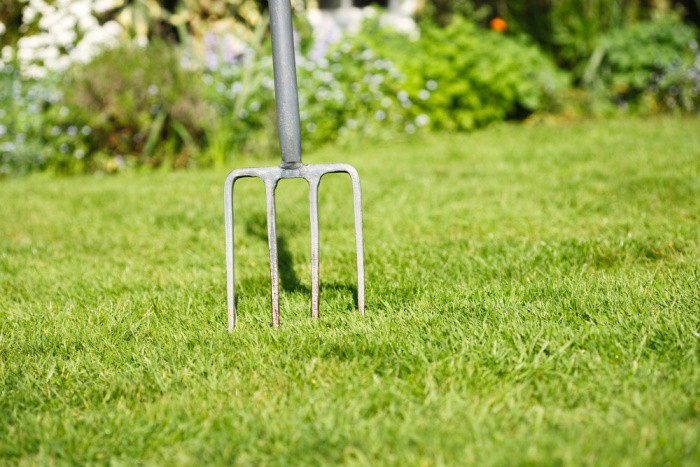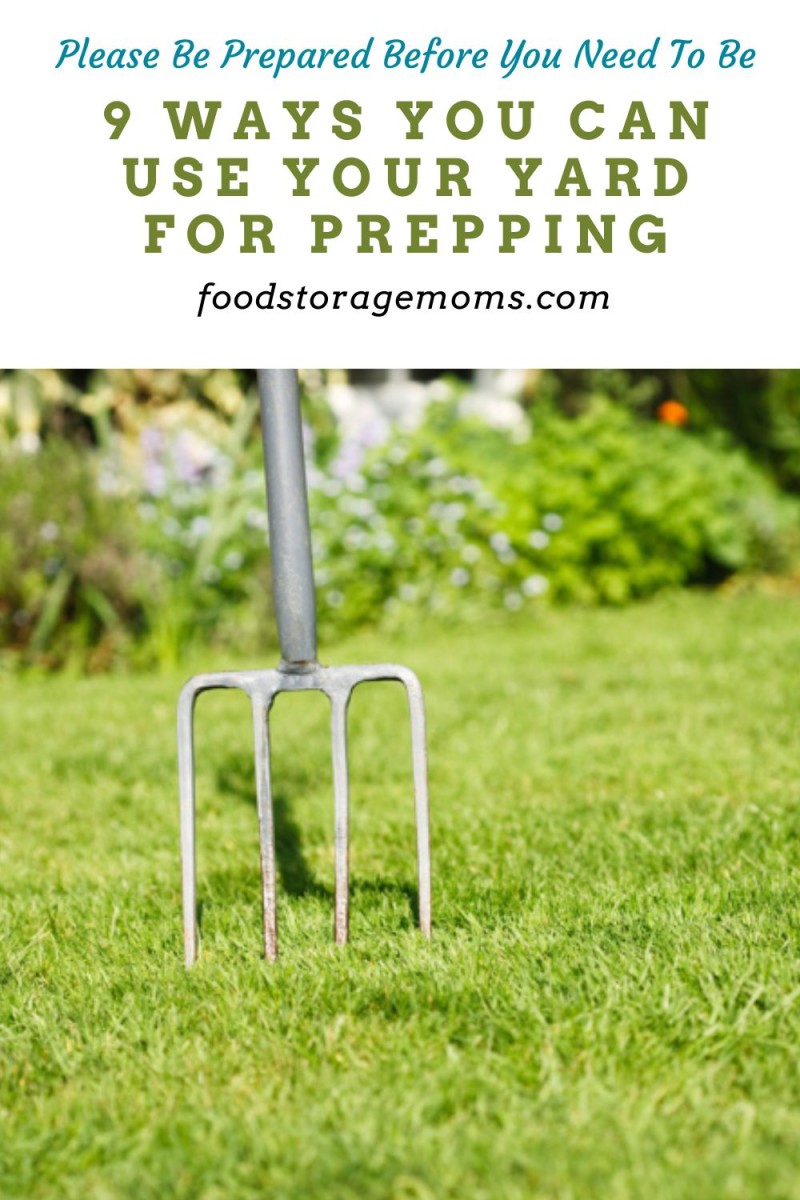9 Ways You Can Use Your Yard for Prepping

Wondering how you can use your yard for prepping? Maybe it’s true that you’ve been preparing for emergencies for several years now and think you’ve learned just about everything there is to know about the subject. While you may have every emergency supply you can think of, along with a good knowledge of what to do in certain tough situations, you may be forgetting about another advantage that you have. YOUR very own backyard!
It’s a true blessing to have your own property to provide safe shelter. Having some ground to grow things is an added blessing when things get tough. One of the challenges with emergencies is the anxiety that is brought on. Having a place to hunker down and deal with things on your own terms provides some comfort physically and emotionally.

How to Use Your Yard for Prepping
When it comes to prepping, have you considered all the different ways that you could be using your yard? Not only does it provide you with more square footage for storing things, your yard can be used for growing and raising food for your family, but that’s just the tip of the iceberg. Keep reading to learn about the many ways you can use your yard when it comes to preparing for emergencies.
1. Growing Crops
Well, the most obvious option that you can do with your yard is to use it for growing fruits and vegetables for your family’s food supplies. Growing your own crops is an ideal way to ensure that your family has a steady supply of fresh produce while providing them with enough essential vitamins and minerals. You may be one of those beginners when it comes to raising a vegetable garden, but we all had to start somewhere. New gardeners do have a learning curve, but the journey can be enjoyable. Whether it’s herbs, lettuces,
View your yard as more than a place that grows weeds. You can plant flowers in a flower garden that are called annuals and have to be replaced each year, but also there are perennials that will come back next year on their own. Both are awesome at attracting bees and butterflies. The blooms bring joy and satisfaction and can be a fun family activity.
This is also beneficial for preppers who want to save money as well as stock up on food during troubling times when things seem uncertain. It doesn’t matter if you’re growing vegetables, fruits, or grains, any edible crop that you grow in your yard can definitely become a part of your emergency plan. Depending on where you live your growing season may be long or short, may be conducive to one plant variety or another, or may have a soil type that is a challenge to grow things. It takes some time to learn this skill, but it’s certainly worth it.
- How to Store Zucchini From the Garden
- How to Start a Garden
- 9 Superfoods You Can Grow in Your Garden
- 7 Steps to Growing Your Own Survival Garden
2. Planting Fruit Trees
Besides using your yard for gardening, you could also plant several different types of fruit trees in your yard. This is a great way to get fresh fruit that you don’t have to buy from the store. Plus, it adds an extra layer of protection in case of an emergency and food become scarce. Fruit trees are also less work than regular gardening, as you only need to water them and prune them occasionally instead of having to do daily weeding and planting like with a traditional garden.
3. Composting in Your Yard for Prepping
Another great option for using your yard for prepping purposes is composting. Composting not only helps reduce the amount of waste going into landfills, but it also provides useful nutrients and minerals to the soil which helps improve the organic matter in your soil. You can even utilize your compost bin to create a nutrient-rich mulching natural fertilizer for your garden and crops if you’re looking to maximize the yield of what you grow!
Organic mulch from your compost pile is a great way to keep from using dangerous chemicals purchased at the local garden center. Whether it’s early in the season or later on when you harvest what’s been growing all season, you’ll find the perfect time to involve all your family members in the process. You can sign up for a gardening newsletter from a number of sources to help you understand the best approach to composting. It may involve using food scraps, lawn clippings, leaves, or other yard debris. They all break down as the sun, rain, and other elements spur the process.
Over time you’ll learn the best time to plant various crops so you dodge an early frost and make the most of each growing season.
4. Store Firewood
Do you have any old trees in your yard or general neighborhood that needs to be cut down in the near future? Firewood is something that you’ll definitely need a lot of in an emergency situation that lasts for more than just a few days. Whether it’s for cooking or for staying warm, utilizing your yard to store firewood for future use is certainly a good idea. Of course, it’s up to you, but you can consider storing your firewood next to your shed or between two trees to help stack the wood if you have ones that are close together. The Best Way to Dry Firewood Quickly
5. Create a Fire Pit in Your Yard for Prepping
Another great idea for using your yard for prepping purposes is to create a fire pit. A fire pit can come in handy during an emergency as it provides heat and light and another option for cooking. You can use the firepit to cook all kinds of meals or to just boil water if needed. Fire pits are relatively easy to make so you should consider crafting one in your backyard if you haven’t already done so! How To Start A Fire In A FirePit
6. Gathering and Storing Water
If you have a pool or small pond on your property, this could be an excellent way of storing drinking water during a crisis. While it may not be enough to supply all your needs, having some extra sources of fresh water will help ease the burden on other supplies such as bottles and tanks. Although you may consider this water as clean enough to drink, you should plan to have a way to treat and/or filter the water for culinary purposes.
- Is Tap Water Safe to Drink?
- Creative Water Storage Solutions for Emergencies
- How to Barter with Food and Water
7. Install Rain Barrels
If you don’t have any bodies of water on your property, consider investing in rain barrels that collect runoff from rooftop downspouts and rain gutters so that you can store the rain for emergency situations. Just be sure that you don’t drink rainwater without treating it first. Doing so without filtering the water from any particles from the atmosphere or rooftop can make you or one of your family members very sick. How to Use Rain Water at Home
8. Raising Chickens
If your yard has the space and you have the patience to do so, consider raising a few chickens in your backyard for fresh eggs. Chickens are not only fairly easy to care for and provide a steady supply of nutrition, but they also help keep the pest population down too!
Some people aren’t in it for the eggs and rather raise chickens solely for their meat, so it’s entirely up to you with what you plan on doing with them. But before you go out and buy a bunch of chickens, make sure you do your homework first to see if your local government or HOA will allow you to have them in your yard. Meat Chickens: What You Need to Know. Egg Chickens: What You Need to Know
9. Raising Livestock for Prepping
This last one is only for a special select few out there, but if you’re looking for something more ambitious and have the acreage and finances, consider raising livestock such as rabbits, pigs, or cows on your property. Not only can this provide your family with several different food options during emergencies, but livestock can also be used for bartering if needed. Raising livestock does require more work than just growing crops or planting fruit trees, but if done properly, it can be quite rewarding and practical. How to Support Local Farmers
Where should I store my prepping equipment?
A shed is a great place to store things. Depending on the size, you can put things like your lawnmower, tiller, cooking equipment, tools, camping gear, emergency kits, bug-out bags, and more. If built properly, the shed should keep things fairly clean and dry. Moisture can cause havoc with things that are metal like many of your hand tools. The shed can also provide protection from various insects and other pests, and keep your plant foods safe from rodents and other critters.
Final Word
These are just a few ideas on how you can use your yard for prepping. There are likely countless more ways that you can utilize your outdoor space to ensure that you and your family are safe and secure during any crisis. Can you think of any other ways to use your yard when it comes to being prepared for emergencies? May God Bless this world, Linda
Copyright Images: Gardening Fork Depositphotos_13129360_S
The post 9 Ways You Can Use Your Yard for Prepping appeared first on Food Storage Moms.
